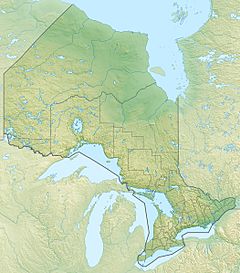Vermilion River (Lac Seul) facts for kids
Quick facts for kids Vermilion River |
|
|---|---|
|
Location of the mouth of the Vermilion River in Ontario
|
|
| Country | Canada |
| Province | Ontario |
| Region | Northwestern Ontario |
| District | Kenora |
| Physical characteristics | |
| Main source | Highstone Lake 366 m (1,201 ft) 50°23′38″N 91°32′27″W / 50.39389°N 91.54083°W |
| River mouth | Lac Seul 357 m (1,171 ft) 50°25′05″N 91°50′11″W / 50.41806°N 91.83639°W |
| Length | 30 km (19 mi) |
| Basin features | |
| River system | Hudson Bay drainage basin |
The Vermilion River is a river located in Ontario, Canada. It flows through the Kenora District in the northwestern part of the province. This river is part of a very large area called the Hudson Bay drainage basin. This means all the water from the Vermilion River eventually flows into Hudson Bay.
Contents
About the Vermilion River
The Vermilion River is an important waterway in Northwestern Ontario. It helps carry water from lakes and smaller streams towards the sea. The river is about 30 kilometers (19 miles) long.
Where the River Starts and Ends
The Vermilion River begins its journey at a place called Highstone Lake. This is where the river's water first gathers.
The river then flows until it reaches its end, which is called its mouth. The mouth of the Vermilion River is at Brechin Bay, a part of Lac Seul. Lac Seul is a large lake located about 35 kilometers (22 miles) north of the town of Sioux Lookout.
How Water Reaches Hudson Bay
The water from the Vermilion River doesn't go straight to Hudson Bay. Instead, it joins a series of other rivers. From Lac Seul, the water flows into the English River.
After that, it connects to the Winnipeg River. Finally, the water travels through the Nelson River before it empties into Hudson Bay. This long path shows how many rivers are connected in a large drainage system.
Smaller Streams Joining the River
Rivers often have smaller streams or rivers that flow into them. These are called tributaries. The Vermilion River has several tributaries that add water to its flow.
- Tully Creek (joins from the right side)
- Bump Creek (joins from the left side)
- Sigurd Creek (joins from the right side)
- Per Creek (joins from the left side)
 | Frances Mary Albrier |
 | Whitney Young |
 | Muhammad Ali |


